Politics
Israel’s six-week drive to hit Hamas in Rafah and scale back war

Israel expects to continue full-scale military operations in Gaza for another six to eight weeks as it prepares to mount a ground invasion of the enclave’s southernmost city of Rafah, four officials familiar with the strategy said.
Military chiefs believe they can significantly damage Hamas’ remaining capabilities in that time, paving the way for a shift to a lower-intensity phase of targeted airstrikes and special forces operations, according to the two Israeli and two regional officials who asked to remain anonymous to speak freely.
There is little chance that Prime Minister Benjamin Netanyahu’s government will heed international criticism to call off a Rafah ground assault, said Avi Melamed, a former Israeli intelligence official and a negotiator in the first and second Palestinian intifadas, or uprisings, in the 1980s and 2000s.
“Rafah is the last bastion of Hamas control and there remain battalions in Rafah which Israel must dismantle to achieve its goals in this war,” he added.
Defense Minister Yoav Gallant said on Friday that Israel Defense Forces (IDF) were planning operations in Rafah targeting Hamas fighters, command centres and tunnels, though gave no timeline for the campaign. He stressed that “extraordinary measures” were being taken to avoid civilian casualties.
“There were 24 regional battalions in Gaza – we have dismantled 18 of them,” he told a media briefing. “Now, Rafah is the next Hamas centre of gravity.”
World leaders fear a humanitarian catastrophe.
Trapped between the two sworn enemies are more than a million Palestinian civilians crammed into the city on the Egyptian border, with nowhere left to run, after fleeing Israeli attacks that have laid waste to much of the enclave.
In a past week of high diplomatic tension, U.S. President Joe Biden phoned the Israeli leader twice to warn him against launching a military operation in Rafah without a credible plan to ensure the safety of civilians. Netanyahu himself said civilians would be allowed to leave the battle zone before the offensive, even as he vowed “complete victory”.
The IDF hasn’t explained how it will move more than a million people within the ruins of the enclave.
According to one Israeli security source and an international aid official, who asked not to be identified, Gazans could be screened to weed out any Hamas fighters before being sent northwards. A separate Israeli source said Israel could also build a floating jetty north of Rafah to enable international aid and hospital ships to arrive by sea.
Nonetheless, an Israeli defence official said Palestinians wouldn’t be allowed to return to north Gaza en masse, leaving scrubland around Rafah as an option for makeshift tent cities. The regional officials also said it wouldn’t be safe to move a large number of people into a northern zone with no power and running water which hasn’t been cleared of unexploded ordinance.
Washington is sceptical Israel has made sufficient preparations for a secure civilian evacuation, several officials familiar with the conversations between the two governments said. Biden said on Friday he didn’t expect a “massive” Israeli ground invasion to happen soon.
Furthermore, according to Hamas, the total victory promised by Netanyahu won’t be quick or easy.
A Hamas official based in Qatar told Reuters that the group estimated it had lost 6,000 fighters during the four-month-old conflict, half the 12,000 Israel says it has killed.
Gaza’s ruling group can keep fighting and is prepared for a long war in Rafah and Gaza, said the official, who requested anonymity.
“Netanyahu’s options are difficult and ours are too. He can occupy Gaza but Hamas is still standing and fighting. He hasn’t achieved his goals to kill the Hamas leadership or annihilate Hamas,” he added.
‘NO EMPTY SPACE IN RAFAH’
Hamas triggered the conflict on Oct. 7 last year when its fighters burst out of the Gaza Strip into southern Israel, killing 1,200 people and seizing 253 hostages. The surprise attack prompted a massive retaliatory Israeli bombardment and ground invasion that have killed more than 28,000 Palestinians.
Much of Gaza has been reduced to rubble by Israel. Fighting continues in the southern city of Khan Younis, with sporadic clashes still breaking out in northern areas supposedly cleared.
More than 85% of Gaza’s 2.3 million inhabitants have been left homeless. Most of the displaced have sought shelter in Rafah, which had a pre-war population of about 300,000.
“There is no empty space in Rafah, over a million and half people are here. Does the world know that? A slaughter is going to take place if the tanks enter,” said Emad Joudat, 55, who fled there with his family early in the war from Gaza City, where he ran a furniture business.
“I am in charge of a big family,” said the father-of-five, who lives in a tent city with no food or water in Rafah. “I feel helpless because don’t know where to go with them if Israel launches an invasion.”
Egypt has sealed off its border to the enclave. Cairo has framed its opposition to the displacement of Palestinians from Gaza as part of wider Arab rejection of any repeat of the “Nakba”, or “catastrophe”, when 700,000 Palestinians fled or were forced from their homes during the 1948 war that accompanied Israel’s creation.
Egypt is nonetheless preparing an area at the border that could accommodate Palestinians, as a contingency should an Israeli offensive into Rafah prompt an exodus across the frontier, three security sources in Egypt told Reuters, declining to be named due to the sensitivity of the matter.
The Egyptian government denied making any such preparations.
Israeli Defense Minister Gallant said Israel had no intention of evacuating Palestinian civilians to Egypt.
‘PLEDGE TO SACRED VICTIMS’
Melamed, the former Israeli intelligence official and negotiator, said the only potential delay to the Israeli assault on Rafah could come should Hamas give ground in hostage negotiations and hand over the prisoners it took on Oct. 7.
“Even that would only delay the advance on Rafah unless it is coupled with the demilitarization of the city and surrender of the Hamas battalions there,” he added.
A senior regional security official said Israel believed some Hamas commanders and hostages were in Rafah.
This month, after weeks of negotiations, Hamas proposed a ceasefire of 4-1/2 months during which it would free all Israeli hostages, Israel would withdraw its troops from Gaza and an agreement would be reached on an end to the war.
Netanyahu rejected the offer as “delusional”. A new round of talks involving America, Egypt, Israel and Qatar on a truce ended without a breakthrough in Cairo on Tuesday.
Senior American officials see securing a deal to release the remaining hostages in exchange for an extended pause in the conflict as the best path to creating space for broader talks, the U.S. sources said. Yet they’re concerned such a deal may not materialise in coming weeks and war will continue into the Muslim holy month of Ramadan in March and April, which could intensify global criticism of Israel’s campaign, they added.
An overarching agreement to end the conflict appears remote.
Any attempt to form a post-war government in Gaza could only succeed if it has Hamas’ approval, according to several sources in the region, including from the militant group and the Palestinian Authority, which was pushed out of Gaza by Hamas in 2007.
Yet something has to give.
Israel has vowed to wipe out Hamas. And the group’s leader in Gaza, Yahya Sinwar, will fight to the death rather than surrender or go into exile, according to Hamas and regional officials.
Israel also remains opposed to any deal involving a permanent ceasefire or a Palestinian state, despite U.S. pressure and international outcry over civilian suffering in Gaza and the lack of progress to a lasting peace solution.
Since October, U.S. Secretary of State Antony Blinken has made five visits to the region. Last month, the State Department said Washington was “actively pursuing the establishment of an independent Palestinian state” with security guarantees for Israel and exploring options with partners in the region.
UK Foreign Secretary David Cameron also told lawmakers that Britain and its allies “will look at the issue of recognising a Palestinian state, including at the United Nations”.
Israel, the U.S. and Britain haven’t formally recognised Palestine, unlike nearly 140 other U.N. nations.
Yet for Netanyahu and many other Israeli officials, talk of a two-state solution amounts to a betrayal of the people killed on Oct. 7.
“I say clearly to anyone still stuck in October 6: We will never lend a hand to the creation of a Palestinian state,” Israeli Culture Minister Miki Zohar said on social media last month. “This is our pledge to the sacred murder victims.”
© Reuters
Current Affairs
New survey points to coalition-led SA, but voter apathy a major factor
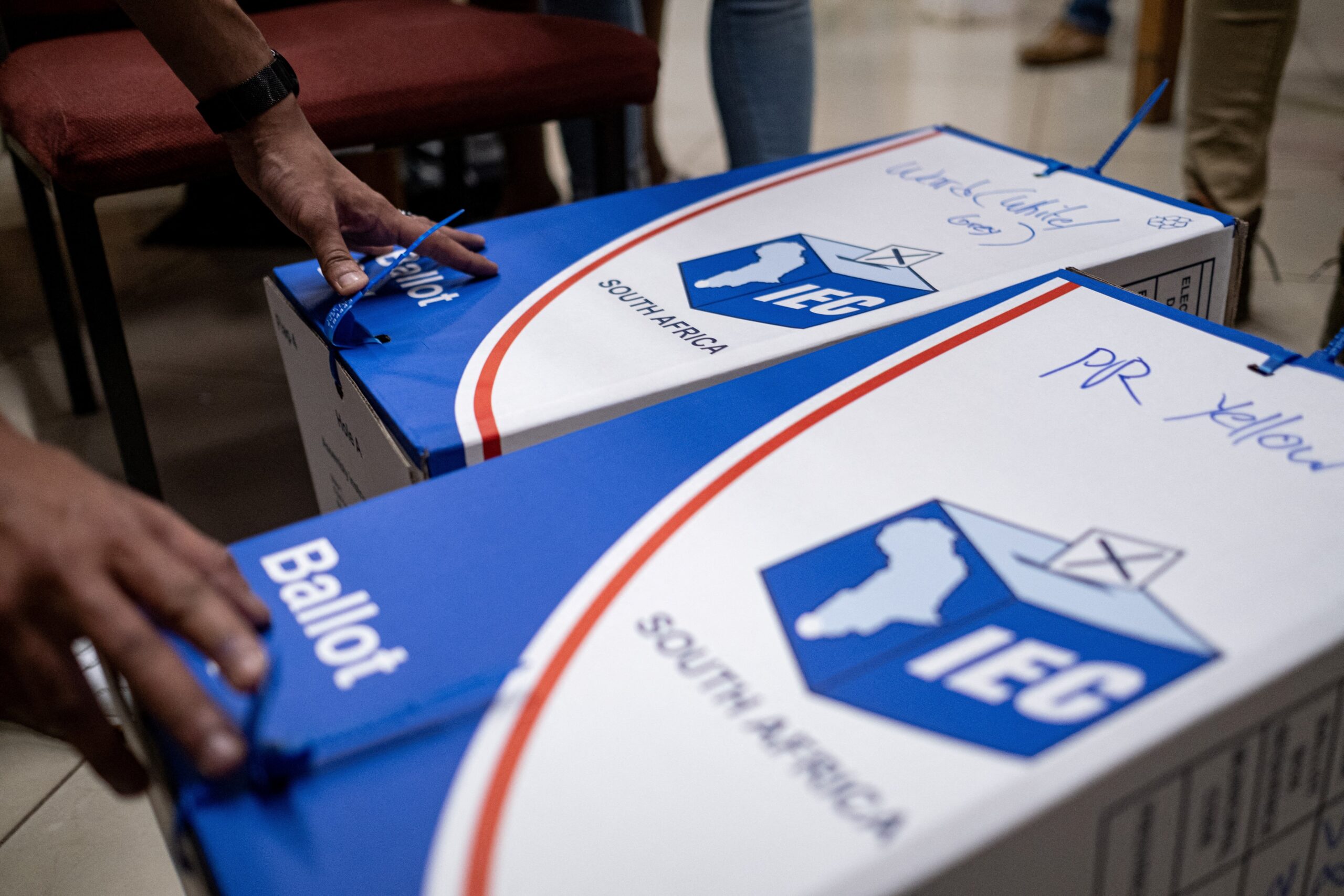
The results of an in-depth survey conducted by African Innovation Research SA (AIRSA) point to the country’s future being in the hands of coalitions and raise concerns about voter apathy, especially among the youth.
The initial sample comprised some 5 000 participants, of whom 46% confirmed they were either not interested in voting despite being registered or had not registered.
The majority of those surveyed by the independent research company based in Cape Town were in the 18–35 age group, a generation who are increasingly disillusioned with how the country is run.
The remaining 2 700 participants, who were interviewed from across a broad section of South Africa’s nine provinces, indicated that support for the ruling ANC is in decline, dipping below the 50% mark to 43% overall.
The ANC’s strongholds remain the Eastern Cape (61% of those surveyed), 58% in the Free State and 65% in Limpopo, where its challenger is the EFF at 23.7%.
In the country’s fourth-largest economy, Mpumalanga, the ANC leads with 52.3%, the EFF at 21.7% and the DA at 19.7%.
In the North West province, it’s a similar pattern, albeit reversed, with the ANC at 48.3%, the DA at 27.7% and the EFF at 20.0%, while in the Northern Cape, the ANC leads with 47.3%, followed by the DA with 24.3% and the EFF with 15.7%.
The country’s economic engine, Gauteng, is a key player in the power dynamics. Here, the ANC garnered 38.7%, but the EFF is growing its base to 19.3%, challenging the DA’s 20% of the province’s voters.
In the Western Cape, as expected, the DA holds onto a leading margin at 46.0%, with the ANC and EFF at 22.3% and 8.7% respectively. Gayton McKenzie’s Patriotic Alliance (PA) also features in the country’s southernmost province, making a notable showing at 5%.
While former president Jacob Zuma may have been barred from becoming a member of Parliament in the Constitutional Court this week, the new uMkhonto weSizwe Party (MKP) will play a pivotal role in KwaZulu-Natal. Results of the AIRSA survey show that while the ANC currently remains ahead with 28.7%, it’s an even race in the province with similar support for the IFP at 26.0% and MKP at 26.7%.
As experience dictates, the smaller parties will begin a series of bargaining tactics as to whose deck they end up in and call the shots.
At collectively accounting for around 20% of the upcoming vote, these potential coalition partners carry significant influence.
AIRSA also noted that voting in this sector is personality-driven as opposed to ideology.
The fragmentation of South Africa’s political landscape could also contribute to increasing dissatisfaction and disillusionment, particularly when linked to the country’s youth and increasing unemployment.
© IOL (Cape Times)
Politics
Zuma lashes out at judges after election ban
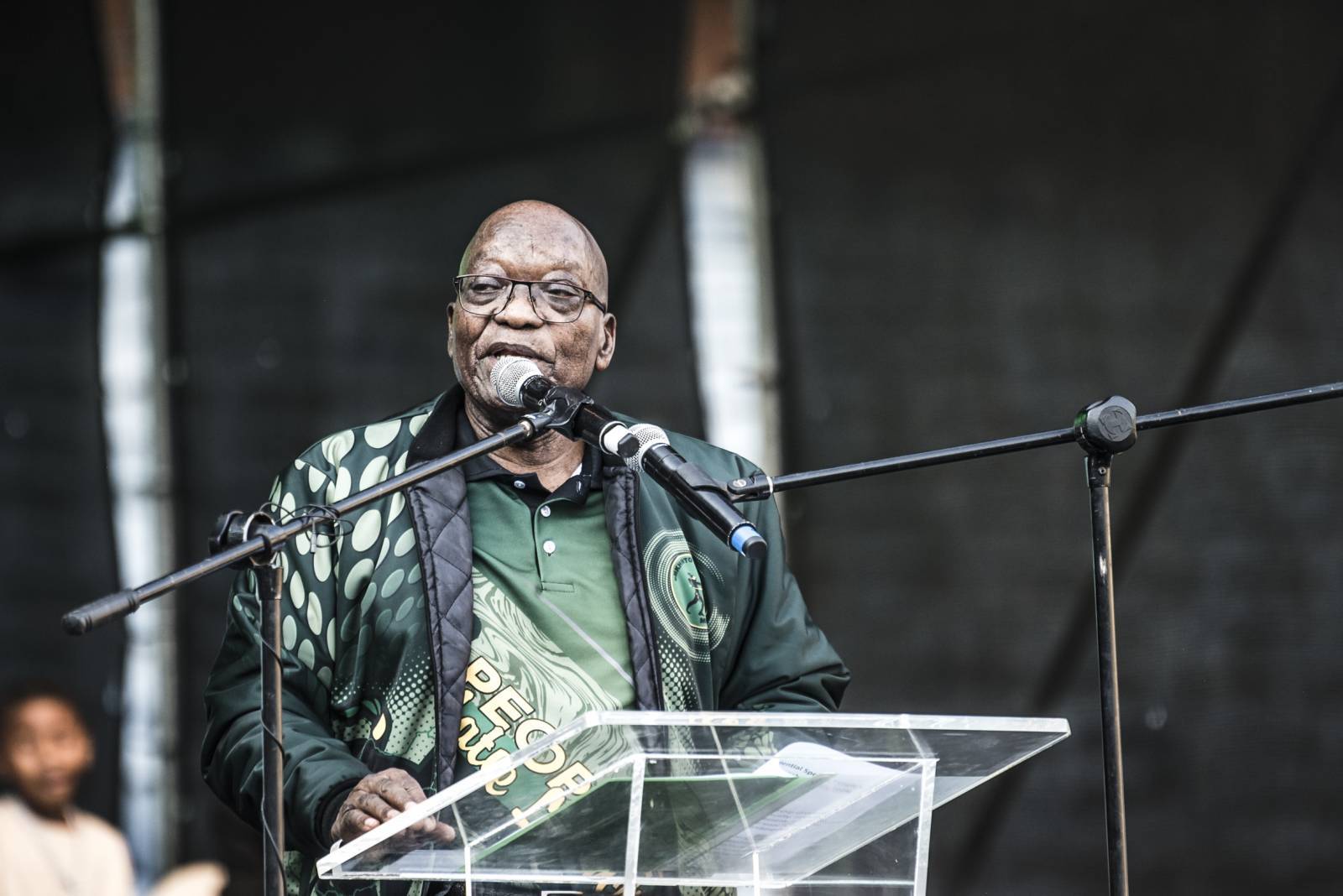
Former President Jacob Zuma has launched a scathing attack on some of the country’s top judges after he was barred from running for parliament on Monday.
In his first interview since the ban, Zuma told the BBC the Constitutional Court was wrong to decide he was unfit to run, based on his 2021 conviction for contempt of court.
“I expected that from our judges, but they are definitely wrong. Not correct,” the 82-year-old said, adding that the constitution should be changed.
Ahead of next week’s general election, Zuma had been campaigning under the banner of the newly formed uMkhonto weSizwe (MK) party.
He joined the party after falling out with the governing African National Congress (ANC), which he used to lead.
The electoral commission argued that the constitution bars anyone who was sentenced to more than 12 months in prison from serving as a lawmaker – a view backed by the Constitutional Court judges.
Zuma was convicted in 2021 for refusing to testify at an inquiry investigating corruption during his presidency.
His lawyers had insisted he was entitled to become an MP as his sentence was reduced to three months after current President Cyril Ramaphosa released him from prison in what was widely seen as an attempt to placate the former president’s angry supporters.
“The judges of the Constitutional Court have acted very funny to me – towards me in particular,” Zuma told the BBC.
“They are not taking into account the will of the people of this country, they use their own will.”
He was president from 2009 to 2018 before being forced out as leader of the ANC amid allegations of widespread corruption in his government.
The corruption, widely known as “State Capture”, saw hundreds of millions of rands of public assets taken into private hands. Zuma has always denied any direct role in corruption, but is due to face trial next year on allegations of bribery.
He told the BBC he had been wrongly stripped of his role as leader of the ANC.
“I don’t know what ‘State Capture’ means. If people say I am corrupt, what did I do? Do you have any facts about it? Am I guilty?
“I was removed before the end of my term, and nothing was produced as evidence that this was an issue.”
Zuma’s MK party had previously voiced its desire to change South Africa’s constitution, which was drawn up 30 years ago at the birth of the country’s democracy following decades of white-minority rule.
Asked about this in the light of his election ban, Zuma reiterated that the historic document needed to be changed.
“This constitution in the continent of Africa is guided by the laws from Europe, not us,” he said.
“There is nothing that has come right in this continent because we are still dominated by those who were the ones [who] slaved us, and after slavery, oppressed us, and after oppression, put their own laws to run us.
“There are details that clash with our lives.”
An Ipsos opinion poll released last month gave MK 8% of the vote, and the ANC 40% as it loses support to MK and other opposition parties.
But some analysts suggest that with the governing party stepping up its campaign in recent weeks, it could still cross the 50% mark. But if the ANC gets less than half of the vote, it would lose its majority for the first time in 30 years.
MK is expected to do especially well in Zuma’s home region of KwaZulu-Natal. Some opinion polls suggest it could emerge as the biggest party in KwaZulu-Natal, ending ANC dominance of the region.
After Zuma was jailed for contempt of court in 2021, angry supporters sparked days of deadly riots. More than 300 people were killed in the clashes.
On Wednesday Zuma said this violence demonstrated the scale of public support for him.
“This must tell you that the masses of this country loves Zuma – that’s why we had that,” he said.
When asked by the BBC if he would use this interview to call for peace and calm ahead of next week’s election, Zuma replied: “I’ve always done so.”
© BBC News
Current Affairs
Iran’s supreme leader leads prayers at Raisi funeral
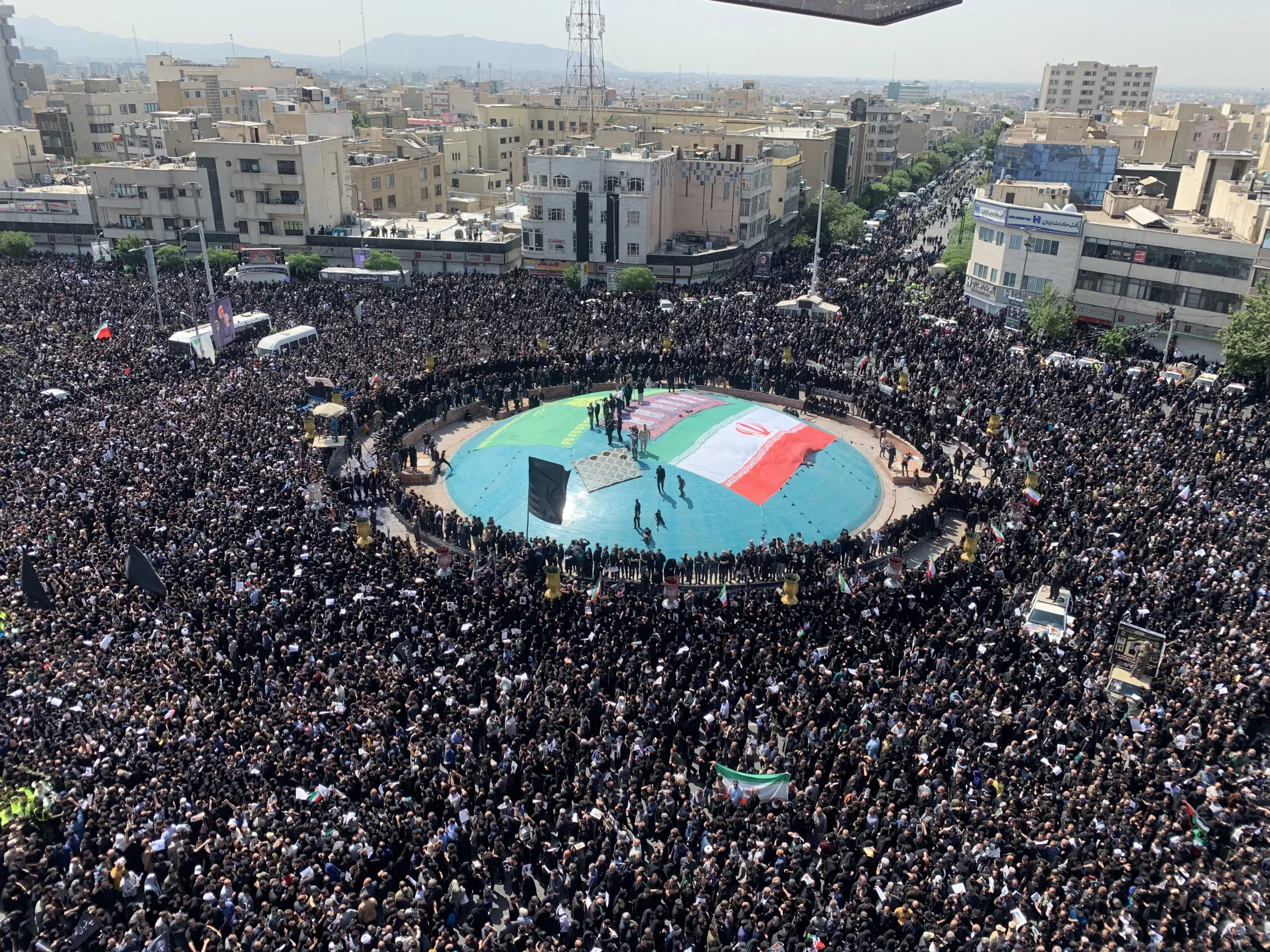
Iran’s supreme leader has presided over a funeral for the country’s late president, foreign minister and others killed in a helicopter crash on Sunday.
Ayatollah Ali Khamenei led prayers at Tehran University, where caskets carrying the dead were draped in Iranian flags.
President Ebrahim Raisi died alongside Foreign Minister Hossein Amir-Abdollahian and six others in a helicopter crash near the border with Azerbaijan.
Authorities had warned against demonstrations against the funeral procession and insults posted online.
“Oh Allah, we didn’t see anything but good from him,” Ayatollah Khamenei said in the standard prayer for the dead in Arabic.
Iran’s acting president, Mohammad Mokhber, stood nearby and openly wept during the service.
People then carried the coffins out on their shoulders, with chants of “Death to America” heard outside.
They loaded them onto a trailer for a procession through downtown Tehran to Azadi Square, where Raisi gave speeches in the past.
In attendance were top leaders of Iran’s paramilitary Revolutionary Guard, one of the country’s major power centres.
Also on hand was Ismail Haniyeh of Hamas, the militant group that Iran has armed and supported during the ongoing Israel-Hamas war.
Haniyeh is widely considered Hamas’s overall leader and has been a prominent member of the movement since 1980. The US Department of State designated him a terrorist in 2018.
“I come in the name of the Palestinian people, in the name of the resistance factions of Gaza…to express our condolences,” Haniyeh said.
He also described meeting Raisi in Tehran during Ramadan, the holy Muslim fasting month.
He said he heard the president say that “the Palestinian issue” remains the key one of the Muslim world, which “must fulfil their obligations to the Palestinians to liberate their land”.
He also claimed that Raisi called Hamas’ October 7 attack in Israel, which saw 1,200 people killed and 250 others taken hostage, an “earthquake in the heart of the Zionist entity”.
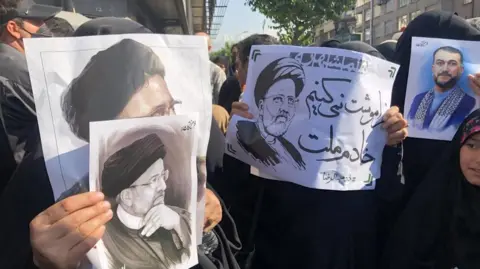
Also expected to attend services in Tehran were Pakistan’s Prime Minister Shehbaz Sharif and a delegation from the Taliban of Afghanistan, which included their Foreign Minister Amir Khan Mutaqqi.
Iran’s theocracy declared five days of mourning over Sunday’s crash, encouraging people to attend the public mourning sessions.
Typically, government employees and schoolchildren attend such events en masse, while others take part out of patriotism, curiosity or to witness historic events.
For Iran’s Shiite theocracy, mass demonstrations have been crucial to demonstrating the legitimacy of their leadership since millions thronged the streets of Tehran to welcome Grand Ayatollah Ruhollah Khomeini in 1979 during the Islamic Revolution, and also attended his funeral 10 years later.
An estimated one million turned out in 2020 for processions for the late Revolutionary Guard General Qasem Soleimani, who was killed in a US drone strike in Baghdad.
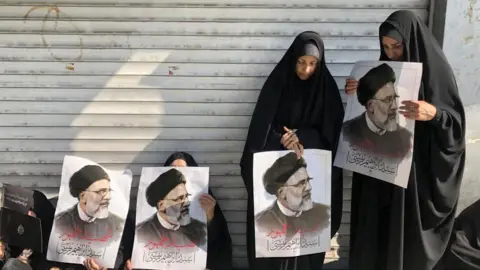
Across the capital, large banners were raised hailing Raisi as “the martyr of service”, while others bade “farewell to the servant of the disadvantaged”.
Some residents in Tehran received texts urging them to attend Wednesday’s ceremonies, the AFP news agency reported.
Footage carried by state TV showed streets filled with mourners, many of whom were carrying pictures of Raisi or the Iranian flag.
Funeral rites for the men began on Tuesday in the city of Tabriz and the Shiite clerical centre of Qom, where thousands of mourners attended ceremonies.
After Wednesday’s procession in the capital, Raisi’s remains will be moved to South Khorasan province, before being transferred to his home city of Mashhad in the northeast.
He will then be buried on Thursday evening in the city after funeral rites at the Imam Reza shrine.
Raisi, a hardline cleric, was a highly divisive figure in Iran. In the 1980s, he oversaw the execution of scores of opposition activists while working as a prosecutor.
He unleashed a brutal crackdown against demonstrators angered by the killing of 22-year-old Mahsa Amini in 2022. She died three days after she was detained by morality police in the capital for allegedly violating Iran’s strict rules requiring women to cover their hair with a hijab, or headscarf.
But his ultra-conservative outlook won favour with supporters of the regime, and Raisi was viewed as a possible successor to Ayatollah Khamenei.
© BBC News
Politics
Ireland to recognise Palestinian state
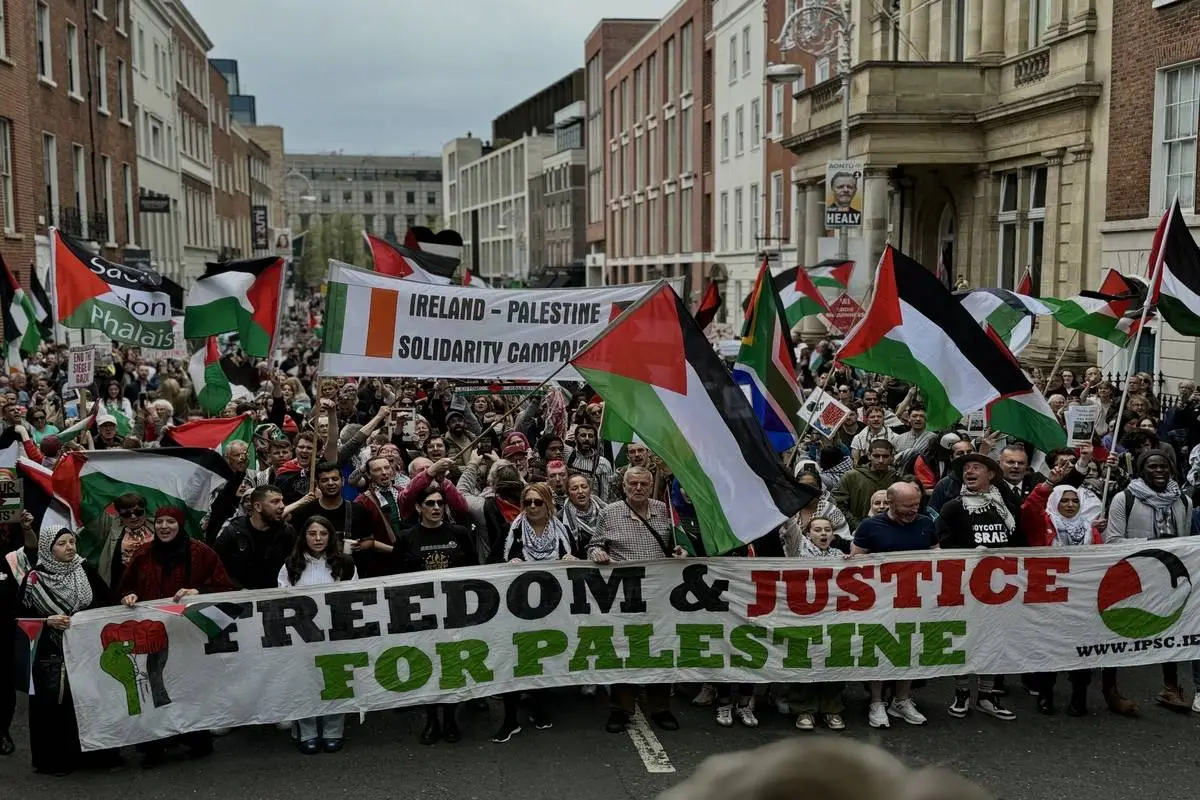
Ireland will recognise a Palestinian state, Prime Minister Simon Harris said on Wednesday, adding that he expected other countries to follow in the coming weeks after talking to world leaders.
“Today, Ireland, Norway, and Spain are announcing that we recognise the state of Palestine,” Harris said at a press conference.
“In the lead up to today’s announcement, I’ve spoken with a number of other leaders and counterparts and I’m confident that further countries will join us in taking this important step in the coming weeks,” he added.
He said a two-state solution was the only credible path to peace and security for Israel, Palestine and their peoples.
The recognition of statehood has particular resonance in Ireland given its history, Harris said.
“Taking our place on the world stage and being recognised by others as having the right to be there was a matter of the highest importance for the founders of our state,” he said.
He added that Ireland was unequivocal in fully recognising Israel and its right to exist “securely and in peace with its neighbours”, and he called for all hostages in Gaza to be immediately returned.
Ireland’s recognition of Palestine will be formally enacted on May 28, foreign minister Micheal Martin said on X.
© Reuters




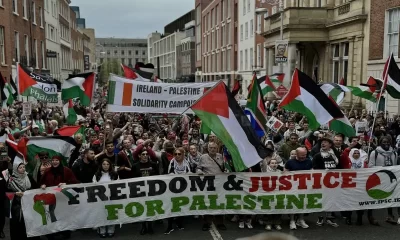

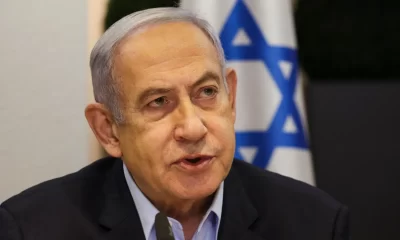

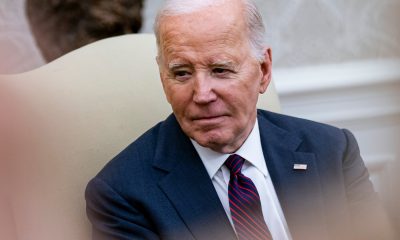

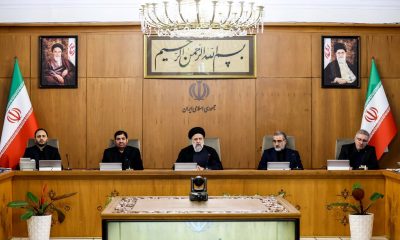








You must be logged in to post a comment Login